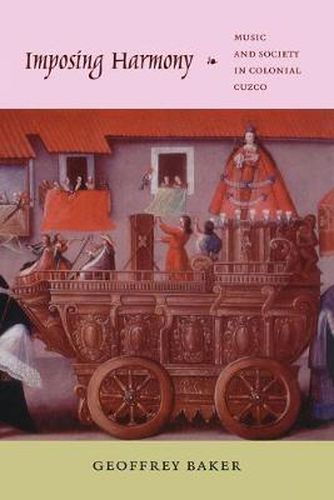Readings Newsletter
Become a Readings Member to make your shopping experience even easier.
Sign in or sign up for free!
You’re not far away from qualifying for FREE standard shipping within Australia
You’ve qualified for FREE standard shipping within Australia
The cart is loading…






Imposing Harmony is a groundbreaking analysis of the role of music and musicians in the social and political life of colonial Cuzco. Challenging musicology’s cathedral-centered approach to the history of music in colonial Latin America, Geoffrey Baker demonstrates that rather than being dominated by the Cathedral, Cuzco’s musical culture was remarkably decentralized. He shows that institutions such as parish churches and monasteries employed indigenous professional musicians, rivaling Cuzco Cathedral in the scale and frequency of the musical performances they staged. Building on recent scholarship by social historians and urban musicologists and drawing on extensive archival research, Baker highlights European music as a significant vehicle for reproducing and contesting power relations in Cuzco. He examines how Andean communities embraced European music, creating an extraordinary cultural florescence, at the same time that Spanish missionaries used the music as a mechanism of colonialization and control.Uncovering a musical life of considerable and unexpected richness throughout the diocese of Cuzco, Baker describes a musical culture sustained by both Hispanic institutional patrons and the upper strata of indigenous society. Mastery of European music enabled elite Andeans to consolidate their position within the colonial social hierarchy. Indigenous professional musicians distinguished themselves by fulfilling important functions in colonial society, acting as educators, religious leaders, and mediators between the Catholic Church and indigenous communities.
$9.00 standard shipping within Australia
FREE standard shipping within Australia for orders over $100.00
Express & International shipping calculated at checkout
Imposing Harmony is a groundbreaking analysis of the role of music and musicians in the social and political life of colonial Cuzco. Challenging musicology’s cathedral-centered approach to the history of music in colonial Latin America, Geoffrey Baker demonstrates that rather than being dominated by the Cathedral, Cuzco’s musical culture was remarkably decentralized. He shows that institutions such as parish churches and monasteries employed indigenous professional musicians, rivaling Cuzco Cathedral in the scale and frequency of the musical performances they staged. Building on recent scholarship by social historians and urban musicologists and drawing on extensive archival research, Baker highlights European music as a significant vehicle for reproducing and contesting power relations in Cuzco. He examines how Andean communities embraced European music, creating an extraordinary cultural florescence, at the same time that Spanish missionaries used the music as a mechanism of colonialization and control.Uncovering a musical life of considerable and unexpected richness throughout the diocese of Cuzco, Baker describes a musical culture sustained by both Hispanic institutional patrons and the upper strata of indigenous society. Mastery of European music enabled elite Andeans to consolidate their position within the colonial social hierarchy. Indigenous professional musicians distinguished themselves by fulfilling important functions in colonial society, acting as educators, religious leaders, and mediators between the Catholic Church and indigenous communities.